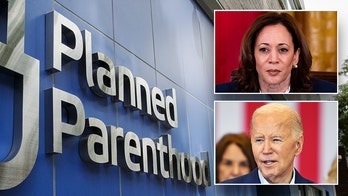Schumer: I propose we rename Russell Building after McCain
Senate Minority Leader Chuck Schumer honors Sen. John McCain on the Senate floor.
Senate Minority Leader Chuck Schumer, D-N.Y., wants to rename the Russell Senate Office Building after the late Sen. John McCain, R-Ariz.
Yet, in a strange twist of irony, many progressive ideals which serve as touchstones of today’s Democratic Party and the progressive movement may not exist were it not for the building’s namesake, Sen. Richard Russell, D-Ga.
Three Senate office buildings sit across the street from the U.S. Capitol, linked by an underground network of tunnels. The newest is the Hart Senate Office Building, named after Sen. Phil Hart, D-Mich. -- the “conscience of the Senate.” Then there’s the Dirksen Senate Office Building, the namesake of longtime Senate Minority Leader Everett Dirksen, R-Ill. Closest to the Capitol is the Russell Senate Office Building. Russell is the oldest of the trio, opened in 1909.
Thirty-five senators and six committees maintain offices in Russell. The structure holds the suite used by McCain and the Armed Services Committee, which he chaired.
Richard Russell served for 38 years in the Senate. A staunch anti-communist, Russell also led the Armed Services Committee. Russell never served as a Senate majority or minority leader. But there’s a reason for that: Russell didn’t need to. He committed to memory all of the Senate’s rules. He could convince fellow senators to vote for bills they otherwise opposed. The idea of a majority or minority leader was a new concept in the Senate in the early 20th century. The Senate is a body of equals. That’s why Senate Majority Leaders Alben Barkley, D-Ky., Scott Lucas, D-Ill., and Ernest McFarland, D-Ariz., struggled. They held the title. But none radiated the political wattage of Richard Russell.
During his time on Capitol Hill, no one commanded all of the Senate’s folkways, methods and procedures quite like Russell.
And here’s the bad part: Russell was a racist and segregationist. He filibustered civil rights bills. He fought legislation banning public lynchings.
“We believe the system of segregation … is a reason to preserve peace and harmony between the races” said Russell, as quoted in Robert Caro’s book “Master of the Senate.”
Russell’s views on race are why Schumer and other Democrats want to rename the building after McCain.
“It is only fitting that his name should adorn a physical institution of the Senate, particularly one that housed the Armed Services Committee,” said Schumer.
But it’s just not Democrats who want to change the name.
“Having a building named after (McCain) makes a lot of sense to me,” said Sen. Tim Scott, R-S.C., the lone African American Republican in the Senate.
“I’m great with that,” said Sen. Deb Fischer, R-Neb., when asked about Schumer’s proposal. “I loved John McCain. He was a good friend and a mentor. He took me under his wing.”
But not everyone’s on board, including lawmakers from Georgia.
Sen. David Perdue, R-Ga., accused Schumer of playing politics.
“McCain just passed away. We need to take a deep breath,” said Perdue.
Sen. Bill Cassidy, R-La., wants to name something after McCain for time immemorial.
“I don’t want to establish the precedent that we can un-honor somebody in the future,” said Cassidy.
In other words, if they can strip the name “Richard Russell” off the Russell Senate Office Building, why couldn’t that happen to the “McCain Senate Office Building” in the future?
“I’d name the Capitol after the old guy if I could,” said Sen. Lindsey Graham, R-S.C.
Graham also suggested naming the Capitol Visitor Center (CVC) after the Arizona Republican.
“John hated it. He thought it was a waste of money,” said Graham, noting with a chuckle that bestowing the CVC with the McCain moniker might be “my last way to get at him.”
But Graham says a lot of the focus seems misplaced at a time of mourning.
“Instead of worrying about what to name for him - which we should name something or a bunch of things -- let’s try to be more like him,” suggested Graham.
The Russell Senate Office Building wasn’t always named after Richard Russell. It was initially just the Senate Office Building – because it was the only one. Some called it the “SOB” for short.
Perhaps that’s a dig at Russell. And, considering the original “SOB” moniker, one McCain friend told Fox that naming the building after McCain would fit the late senator perfectly.
But here’s why Russell was important:
Take a look at the aforementioned “Master of the Senate” by Robert Caro. The 1,100-page magnum opus details how Lyndon Baines Johnson truly became the master of the Senate as no one had really done before him. Remember those other Senate leaders who lacked the chops? Guess who arrived on the scene who did? Lyndon Johnson. Johnson went on to become one of the most-powerful Senate leaders of all-time. The only others who come close are Sens. Robert Byrd, D-W.Va., Bob Dole, R-Kan., Howard Baker, R-Tenn., and Mike Mansfield, D-Mont.
For good or ill, when Johnson became president, he successfully advanced his “Great Society” programs through Congress. That included passing landmark civil rights legislation, waging a “war on poverty.” Congress approved legislation creating the Medicare and Medicaid programs. Johnson signed laws on consumer protection and housing. He corralled the votes to create the National Endowment for the Arts, the National Endowment for the Humanities and launched public broadcasting.
How did Johnson achieve this? Well, he learned the Senate and developed his bona fides from Richard Russell.
Russell could have moved into a vacant leadership post any time he wanted. But he didn’t want to get bogged down in details. In 1951, Johnson became the Senate Democratic Whip. The sole reason? As Caro writes, Johnson had the backing of “one man,” Richard Russell. Two years later, Johnson became Democratic Leader.
In order to understand Johnson, one must dig deeply into Russell. Caro does so in his tour de force, devoting an entire chapter to the Georgia Democrat: “A Russell of the Russells of Georgia.” It was Russell’s own mastery of the Senate which partly helped President Franklin Delano Roosevelt muscle through his own legislative program during the Great Depression: “The New Deal.”
Russell espoused views on race which are offensive today. But were it not for Richard Russell, and later, his agent Lyndon Johnson, major tenets of the Democratic party’s platform would not be law today.
It’s unclear if Schumer and others will get their way and rename the Russell building after McCain. Senate Majority Leader Mitch McConnell, R-Ky., is empaneling a bipartisan “gang” to determine the proper way to honor McCain.
“In addition to getting things done, he also wanted to get them through in the regular order,” said Senate Rules Committee Chairman Roy Blunt, R-Mo., of his fallen colleague. “I’m sure the Senate will find a way to honor him.”
One senior Senate source tells Fox they think the Senate should name something “new” after McCain. That may yet happen.
Democrats will talk a lot of preserving major New Deal and Great Society programs on the campaign trail this fall. Richard Russell doesn’t align with contemporary views on race. But the party and the country would look a little different today if it weren’t for him and his protégé Lyndon Johnson.





